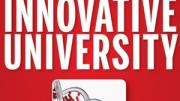Colleges and universities will need to change their business model in the near future if they’re to survive ever-soaring tuition, facilities, and payroll costs, Cizik professor of business administration Clayton Christensen told the Boston Globe. “It’s going to get really bad for traditional universities a lot sooner than most people think,” he said, adding that institutions are relying too heavily on their endowment income to maintain budgets. Christensen, author of the new book The Innovative University: Changing the DNA of Higher Education from the Inside Out (Wiley/Jossey-Bass), predicts that online courses will expand, allowing people to customize their education at much lower costs—thereby altering the landscape of higher education dramatically.
It’s a viewpoint many institutions don’t want to hear, according to Jeffrey Selingo, editor of the Chronicle of Higher Education, who wrote that administrators might consider Christensen’s ideas “toxic.” In a recent Harvard Magazine article, Christensen and his coauthor, Michael B. Horn, M.B.A. ’06, asserted that for many unprepared institutions, the winds of change may be disruptive. “The business model that has characterized American higher education is at—or even past—its breaking point,” they wrote. “Many institutions are increasingly beset by financial difficulties, and the meltdown since 2008 is but a shadow of what is to come.”









